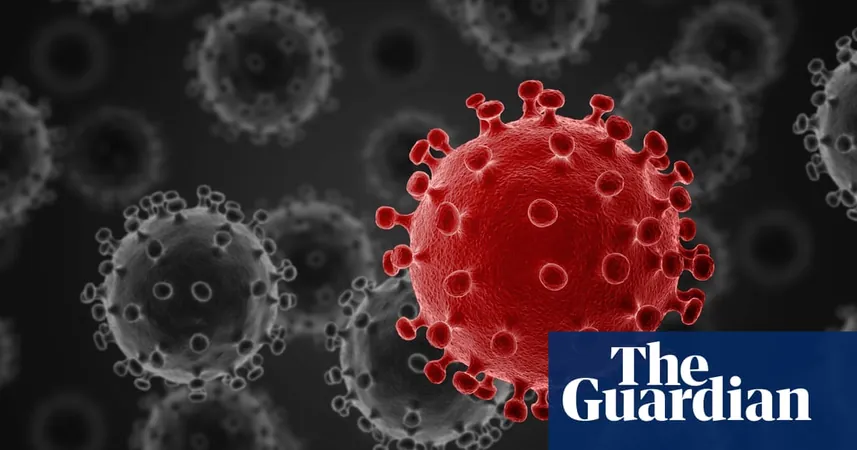
Urgent Call for Research on 24 Deadly Pathogen Families to Mitigate Future Pandemic Risks
2025-03-25
Author: Li
Introduction
Government experts in the UK are sounding the alarm on the need for intensified research into 24 dangerous pathogen families, including notable threats like bird flu, plague, and Ebola. According to a groundbreaking report by the UK Health Security Agency (UKHSA), these deadly organisms could significantly compromise public health, necessitating immediate action and prioritization for research funding.
The Importance of Research
This innovative tool identifies a range of viruses and bacteria where current gaps in vaccines, diagnostics, treatments, or emerging challenges stemming from climate change and drug resistance pose a substantial biosecurity risk. Dr. Isabel Oliver, the chief scientific officer at UKHSA, highlighted that while many of these pathogens currently do not circulate in the UK, significant environmental changes could alter their geographic spread, creating potential health crises.
Highlighted Pathogen Families
Among the pathogen families included in the report are Filoviridae, which encompasses the fearsome Marburg and Ebola viruses, and Flaviviridae, known for mosquito-borne diseases such as dengue and Zika. Equally concerning are the bacteria that cause notorious diseases like plague (Yersinia pestis) and anthrax (Bacillus anthracis). The list also features the Orthomyxoviridae family, which includes avian influenza, and Coronaviridae, which is home to the virus responsible for Covid-19.
Climate Change and Biosecurity Risks
Dr. Oliver emphasized that the UKHSA is scrutinizing not only the pandemic potential of these pathogens but also how shifts in climate conditions can expedite their threat. The increasing distribution of disease-carrying mosquitoes and ticks, driven by climate change, is a growing concern, as these vectors can lead to the emergence of adverse health effects in humans.
Proactive Investment in Research
Crucially, the document does not aim to predict the next pandemic's exact cause but rather focus on which pathogens require immediate scientific investment and detailed study. This proactive approach intends to ensure that resources are deployed effectively to manage potential threats before they escalate.
The Call to Action
The report also calls attention to pathogens like norovirus from the Caliciviridae family, which poses a significant health burden in the UK but currently lacks specific treatments or vaccines. In the wake of the UK Covid inquiry findings, which criticized a previous overemphasis on influenza risks, experts stress that public health agencies must prepare for an array of potential pandemic threats, including those from less familiar pathogens.
Warnings from Experts
In remarks that underscore the gravity of the situation, Professor Mark Woolhouse from the University of Edinburgh warns that a novel virus resembling measles could surpass Covid-19's impacts significantly. He noted that such a virus would likely be more contagious and pose a greater risk to children—a demographic that Covid-19 did not threaten as directly.
Unpredictable Future Threats
The emergence of the so-called "Disease X" underscores the unpredictability of future health threats, reiterating the necessity of ongoing surveillance and research. The UKHSA report serves as a timely reminder of the importance of vigilance and versatility in public health preparedness, ensuring the global community is ready to combat whatever health challenge may arise next.
Conclusion
As the world braces for future health challenges, the call for immediate action to prioritize research into these lethal pathogens has never been more urgent. Are we prepared to face the threats that lie ahead? The stakes couldn’t be higher!



 Brasil (PT)
Brasil (PT)
 Canada (EN)
Canada (EN)
 Chile (ES)
Chile (ES)
 Česko (CS)
Česko (CS)
 대한민국 (KO)
대한민국 (KO)
 España (ES)
España (ES)
 France (FR)
France (FR)
 Hong Kong (EN)
Hong Kong (EN)
 Italia (IT)
Italia (IT)
 日本 (JA)
日本 (JA)
 Magyarország (HU)
Magyarország (HU)
 Norge (NO)
Norge (NO)
 Polska (PL)
Polska (PL)
 Schweiz (DE)
Schweiz (DE)
 Singapore (EN)
Singapore (EN)
 Sverige (SV)
Sverige (SV)
 Suomi (FI)
Suomi (FI)
 Türkiye (TR)
Türkiye (TR)
 الإمارات العربية المتحدة (AR)
الإمارات العربية المتحدة (AR)